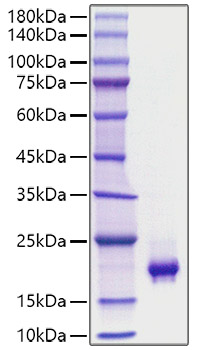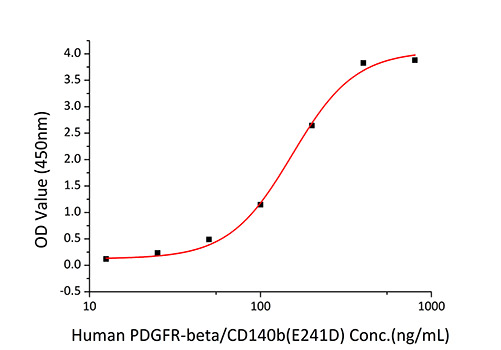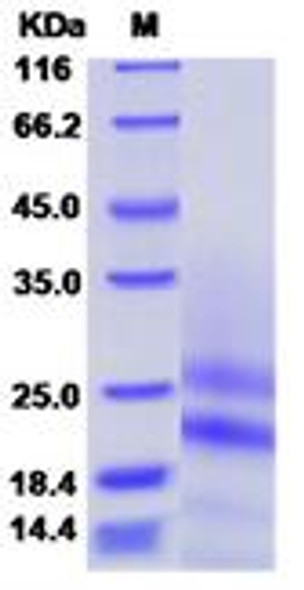Description
Recombinant Mouse PDGF-BB Protein
The Recombinant Mouse PDGF-BB Protein is a high-quality recombinant protein designed for murine biological research applications. This protein serves as an essential reagent in mouse model studies, comparative immunology research, and preclinical therapeutic evaluations, enabling scientists to investigate PDGF-BB biology and its relevance to human disease mechanisms through translational research approaches.
This product (SKU: RPCB1776) is produced using advanced expression systems and features a C-6His tag for convenient detection and purification. The protein exhibits a calculated molecular weight of 13.06 kDa with an observed molecular weight of 15-25 kDa under denaturing conditions, achieving ≥ 95 % as determined by SDS-PAGE.. Functional bioactivity has been validated through rigorous quality control assays, confirming its suitability for demanding research applications.
Key Features
| High Purity by Affinity Chromatography | |
| Mammalian & Bacterial Expression Systems | |
| High lot-to-lot consistency via strict QC |
| Product Name: | Recombinant Mouse PDGF-BB Protein |
| SKU: | RPCB1776 |
| Size: | 10 μg , 20 μg , 50 μg , 100 μg |
| Reactivity: | Mouse |
| Synonyms: | Sis, c-sis, PDGF-2, PDGF-B;PDGFB |
| Tag: | C-6His |
| Calculated MW: | 13.06 kDa |
| Observed MW: | 15-25 kDa |
| Gene ID: | 18591 |
| Protein Description: | High quality, high purity and low endotoxin recombinant Recombinant Mouse PDGF-BB Protein (RPCB1776), tested reactivity in HEK293 cells and has been validated in SDS-PAGE.100% guaranteed. |
| Endotoxin: | < 1 EU/μg of the protein by LAL method. |
| Purity: | ≥ 95 % as determined by SDS-PAGE. |
| Formulation: | Lyophilized from a 0.22 μm filtered solution of 20mMNaAc-Hac pH4.5 |
| Bio-Activity: | Measured by its binding ability in a functional ELISA.Immobilized Human PDGFB (RPCB1776) at 2 μg/mL (100 μL/well) can bind Human PDGFRB (RPCB0314) with a linear range of 12-153 ng/mL. |
| Reconstitution: | Centrifuge the vial before opening. Reconstitute to a concentration of 0.1-0.5 mg/mL in sterile distilled water. Avoid vortex or vigorously pipetting the protein. For long term storage, it is recommended to add a carrier protein or stablizer (e.g. 0.1% BSA, 5% HSA, 10% FBS or 5% Trehalose), and aliquot the reconstituted protein solution to minimize free-thaw cycles. |
| Storage: | Store at -20℃.Store the lyophilized protein at -20℃ to -80 ℃ up to 1 year from the date of receipt. After reconstitution, the protein solution is stable at -20℃ for 3 months, at 2-8℃ for up to 1 week. |
PDGFs are mitogenic during early developmental stages, driving the proliferation of undifferentiated mesenchyme and some progenitor populations. During later maturation stages, PDGF signalling has been implicated in tissue remodelling and cellular differentiation, and in inductive events involved in patterning and morphogenesis. In addition to driving mesenchymal proliferation, PDGFs have been shown to direct the migration, differentiation and function of a variety of specialised mesenchymal and migratory cell types, both during development and in the adult animal. Other growth factors in this family include vascular endothelial growth factors B and C (VEGF-B, VEGF-C)which are active in angiogenesis and endothelial cell growth, and placenta growth factor (PlGF) which is also active in angiogenesis. PDGF plays a role in embryonic development, cell proliferation, cell migration, and angiogenesis. PDGF is a required element in cellular division for fibroblast, a type of connective tissue cell. PDGF is also known to maintain proliferation of oligodendrocyte progenitor cells. Platelet-derived growth factor subunit B is also known as PDGFB, FLJ12858, PDGF2, SIS, SSV, c-sis, is a member of the platelet-derived growth factor family. PDGFB can exist either as a homodimer (PDGF-BB) or as a heterodimer with the platelet-derived growth factor alpha polypeptide (PDGF-AB), where the dimers are connected by disulfide bonds. Mutations in this gene are associated with meningioma.








